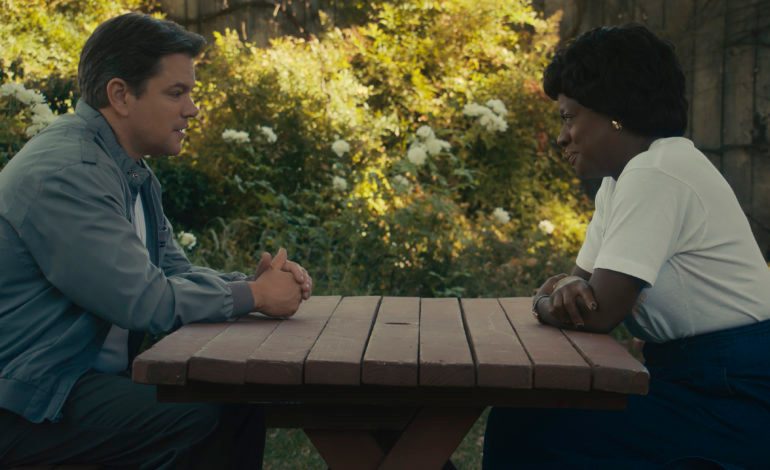

Welcome to 1984- A time when Rubik’s Cubes, high-end ‘grape’ cars, and Miami Vice were kings of the pop culture court. On the basketball court? It was Converse and Adidas. And that’s where the script of screenwriter Alex Convery, with no other IMDB credits to his name, comes in. Fortune should have it that his script, about the Nike marketing executive who signed a young Michael Jordan to a shoe deal of a lifetime, ended up on the desk of proud new production company papas Matt Damon and Ben Affleck. It became Convery’s first sold screenplay and the first project to be made at Artists Equity. It feels fitting that the team who pulled their success by the bootstraps with Goodwill Hunting would give a 20-something the same opportunity.
The rookie screenwriter and the rookie basketball player are the only newbies on a team of seasoned professionals, most of whom have worked together before and call themselves friends. One of these friends is the everything-spice seasoned professional Bob Richardson, who worked with Affleck on Live by Night). His camera forte keeps the audience latched onto the game, from momentum-pumping tracking shots through the Nike office to the innumerable very personal experience actor’s cheeks as he leans into the extreme closeups in this one. It’s a lot, but it does what it’s supposed to do. In a movie that has a lot of people talking to each other, it drives up that intensity. We know they’re getting into a stirring story when we push in close.
Initially, I figured this was a script made by actors because it’s so gracious to the hefty chunks of dialogue that performers fight to sink their teeth into. I was almost right. Instead, it was written by a screenwriter who told Affleck that they would pass on it, playing by Affleck’s golden rule that; “It’s always the best idea wins.” And so the pass was made while still giving Convery singular screenplay credit to the end. The group revisions continued set though, as Convery said; “Chris Tucker’s stuff is almost all him. Jason Bateman… was doing a ton of invention,” and that “There was just a kind of permission to do what you want and if it doesn’t work, it doesn’t work.” And get this- “To me, the best line in the movie is something Viola just improved on the day: ‘A shoe is just a shoe until my son steps into it.’”
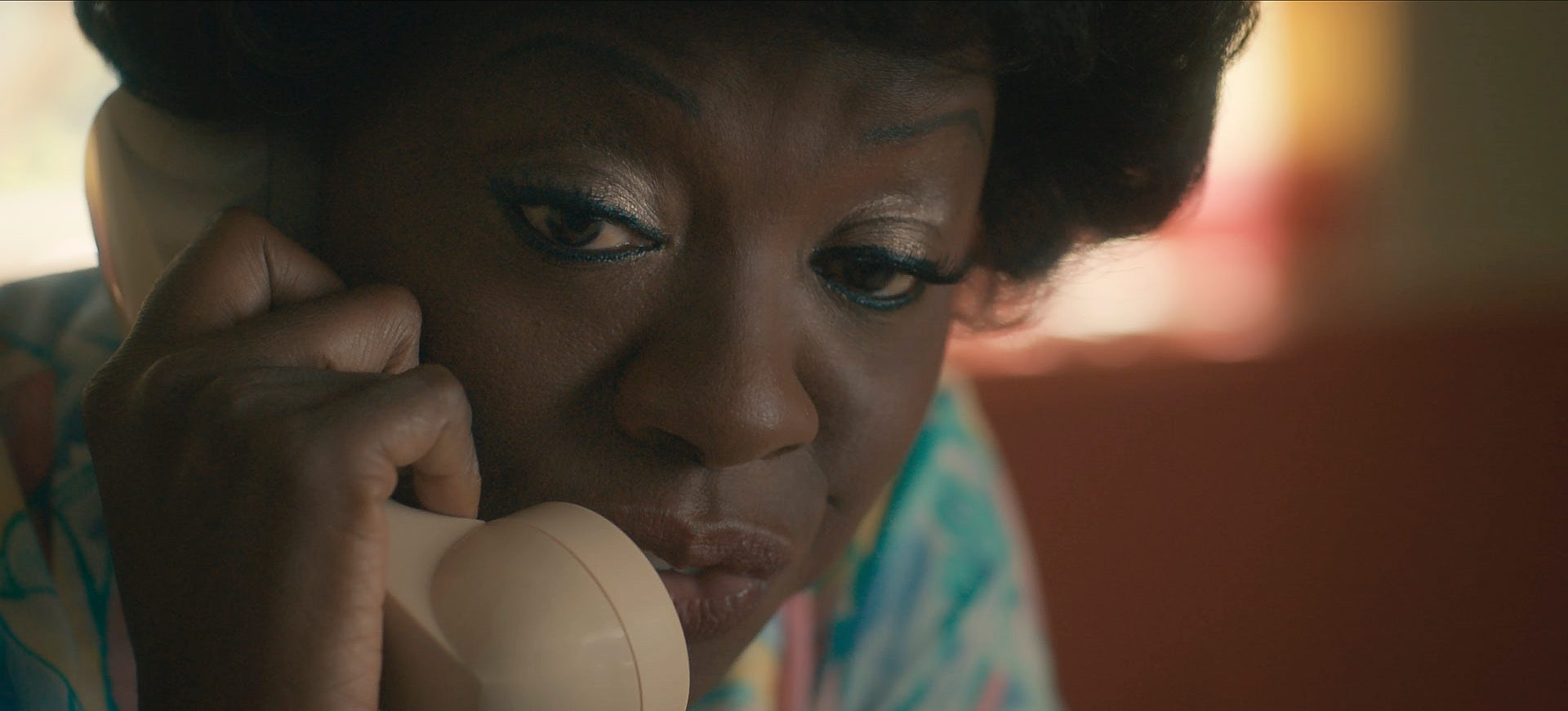

Of course, Viola Davis improvised the best line in the movie to a boom mic in an otherwise actor-less room, as only a queen of her stature would be able to do. It’s well known now that when Affleck sat down with real-life Jordan to get his blessing, he specifically requested Davis play his mother. He insisted that she was the crucial MVP in that Nike deal, fighting for everyone who’s ever known their worth and wants compensation. At that time, the role of Michael’s mom only had two lines. And that’s where those rewrites came in! With the final draft, they were able to offer her a role she deserved- including one for her husband, Julius Tennon, who so joyfully plays her husband/Michael’s dad in the movie.
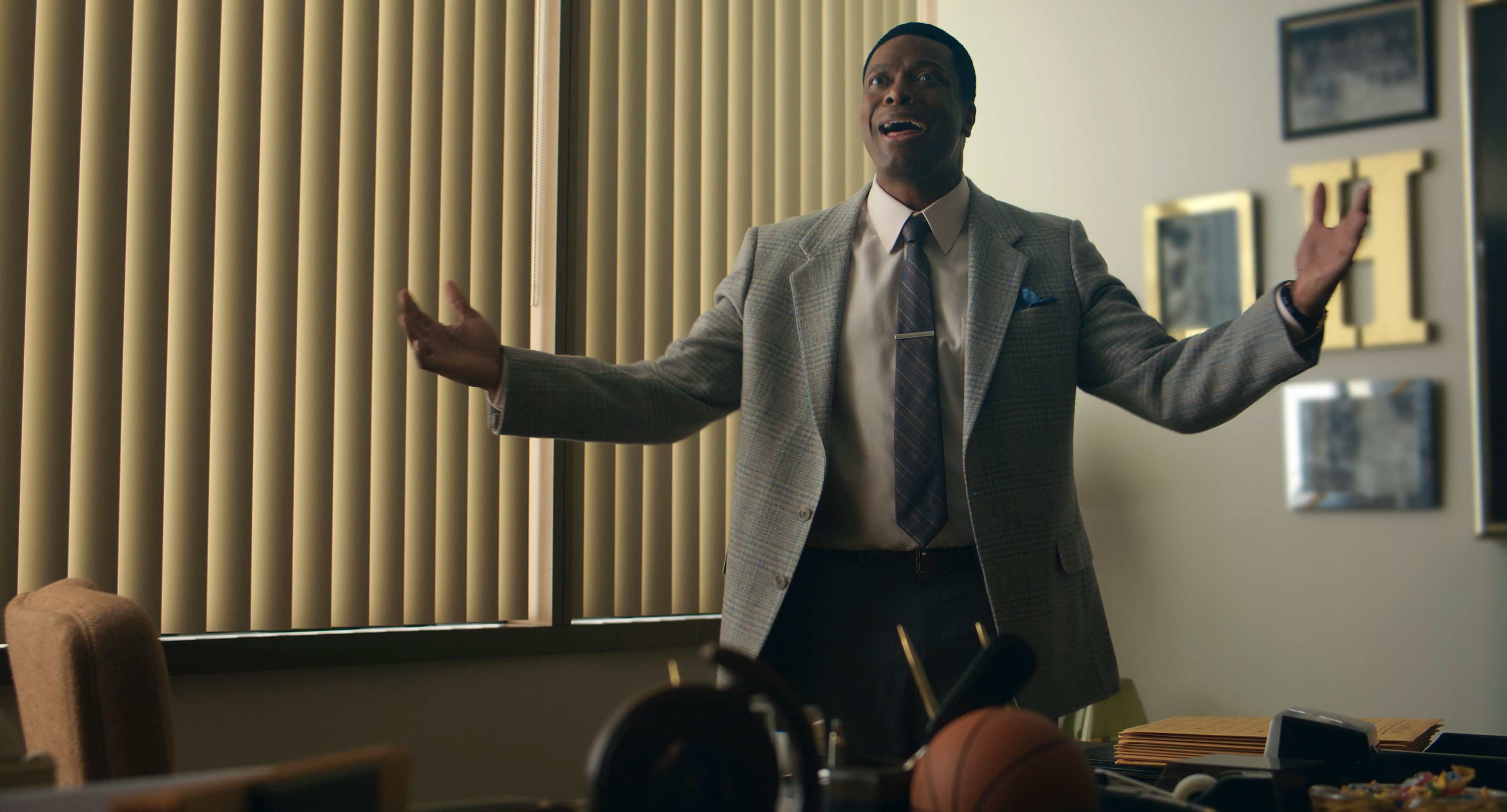

Convery mentioned that Tucker’s material came almost solely from his comedic genius. His first scene in the movie contains the most jokes stacked into an office since The Office and delightfully less cringe. Both Damon and Affleck have their share of laughs in a film that was unexpectedly hilarious, but next to Tucker, it’s Chris Messina, playing Jordan’s agent, that comes in hot and heavy with the humor. Messina as a “wall street, bro” agent makes sense. It’s his bread and butter. His- whatever the 80s version of crypto and non-fungible token would be. If you wanted to cast anyone else in that role, you’d be crazy. You’ll likely hear no end to the amount of praise that’s being loaded on a particularly crazed phone call he has with Damon. The juxtaposition in their temperaments fired back and forth like a pink pong popping through the phone line is a comedic dream come true.
Before we move on from comedic dreams, one more mention should be given to Matthew Maher, who plays the Air Jordan designer, Peter Moore. Or, I wrote his name on my notepad while watching the movie; ‘MATTHEW MAHER!!!!!’ You could say I was very excited and impressed by the character he created, judging by the excessive capitalization and exclamation points, and scribbled words ‘brilliant’ and ‘genius’ to accompany them.
Of course, the list of notable cast performances can not overlook Jason Bateman, who delivers a late-night office speech about what Nike shoes mean to him- that he has a relationship with his daughter, who he only gets to see for four hours on Sundays. He is not exempt from extreme closeups that display every pore of honesty, just like the emotional speeches implemented by his hard-hitting peers.
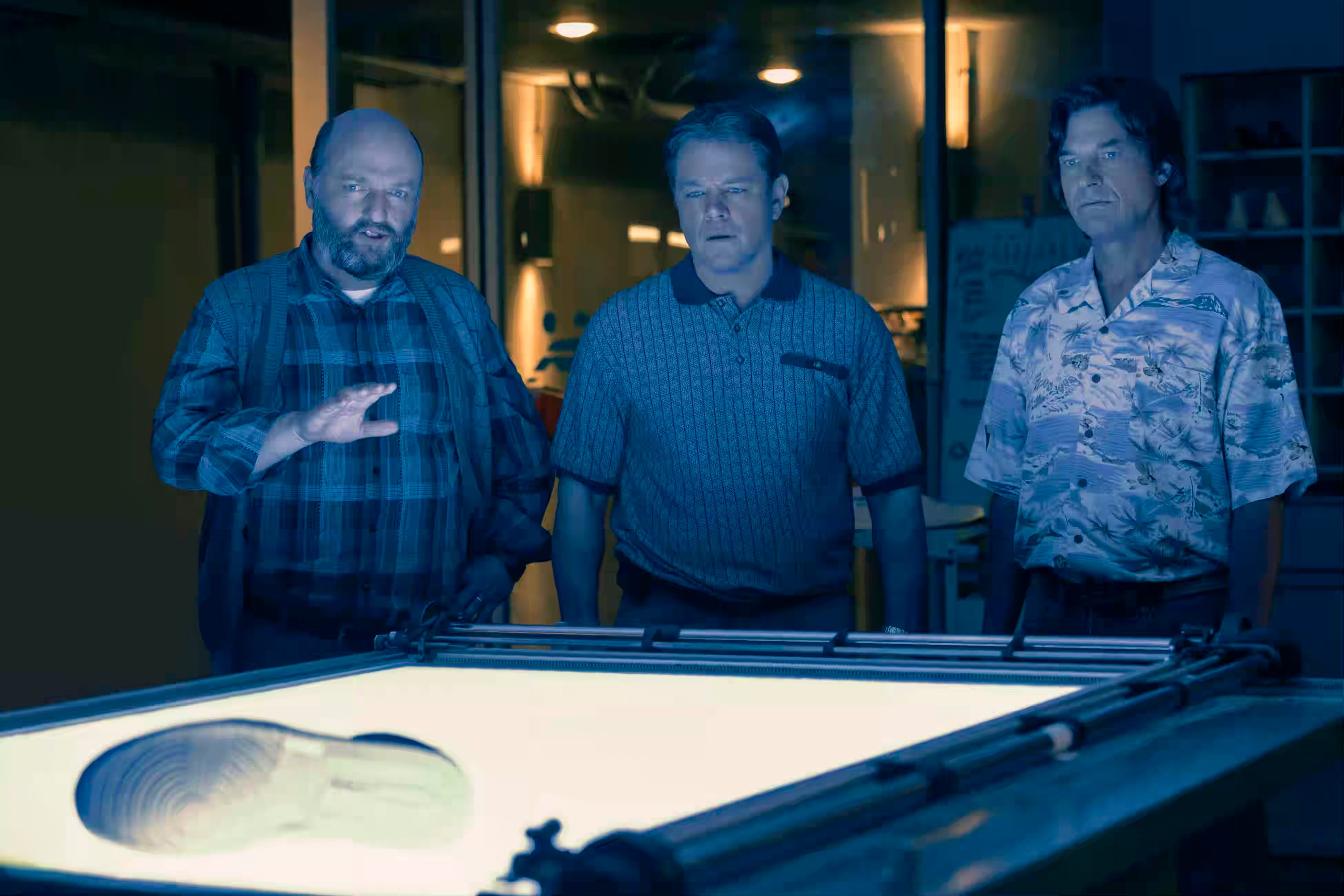

To round off the 2024 SAG award nominees is the man of the hour, Damon, who leads us around Air’s world in his tucked-in polo shirt to the musical ’80s ambiance traditionally reserved for coked-out clubhouse scenes. Towards the movie’s end, the stakes build up in formulaic mastery for the past hour peak in a high-anxiety pitch meeting with the Jordan family. The filmmakers are toying with the audience’s emotions that are precisely where they want them, having us believe that the outcome we know is going to happen could, in some alternative universe, somehow not happen. That’s when the boiling point of tension is at just the right temperature for Dillion to step in, accompanied by a battle cry, drum roll score, with his Rocky Balboa-style sales pitch. “Who are you, Michael? That’s the question that will define you.”
Michael replies with… nothing. In the movie, Michael (played by Damian Young) only has one line at the very end. “Hello,” he says, over the phone, as a faceless presence a la Charlie’s Angeles’ Charlie. Even when he walks into the Nike room for their pitch, he’s turned, looking at the pictures on the wall for the whole shot. We only ever see his back. It is, of course, entirely purposeful.
It’s not like they just forgot to put the guy whose name is the implied other half of the film’s title in the movie. The choice, Affleck told The Hollywood Reporter, came down to the fact that “Jordan is too big. He exists above and around the story, but if you ever concretize him, if you ever say, “Yes, that’s Michael Jordan,” we know it’s not, really. It’s fake. I thought if the audience brought everything they thought and remembered about him and what he meant to them to the movie and projected it onto the movie, it worked better.” So, is he pushing off some of his job as a director onto the audience? Is he holding up Jordan to be of god-like importance that we cannot look upon? Yes, and expertly, because it works.
The whole movie works in the way of a mechanized sports game that’s been drawn up and strategized with the team of professionals that it was. What could have been a bogged-down drama of business chitchat is transformed with quick tracking shots, peppy music, peppered clips from the 80s ‘archival’ footage, and the overall comedic overtone. It’s a streamlined piece with no extraneous fluff. The filmmakers have designed the script to be as focused as the players on the court. The characters are never, not ever, not talking about the plot’s only element: getting Michael Jordan to sign with Nike.
Because of this movie’s pace, the constant dribble, jog, and toss, any complaints that could be given are brushed past so quickly that there’s no time to marinate in any umbrage actually to mention. For example, the stakes are laid out in a very traditional sports bio-pic way so that Air have could quickly shuffled into a rank of heartfelt but mediocre sports movies. It’s hard not to make this genre of film without that formula- the audience needs to know that our lead is a real underdog and up against incredible odds. In Air, that burden manages to be spun in a way that’s performed so well and so stealthily that just as you think it could potentially weigh down the film’s energy, it’s zapped with ticklish comedy, and the ball is passed for the next play.
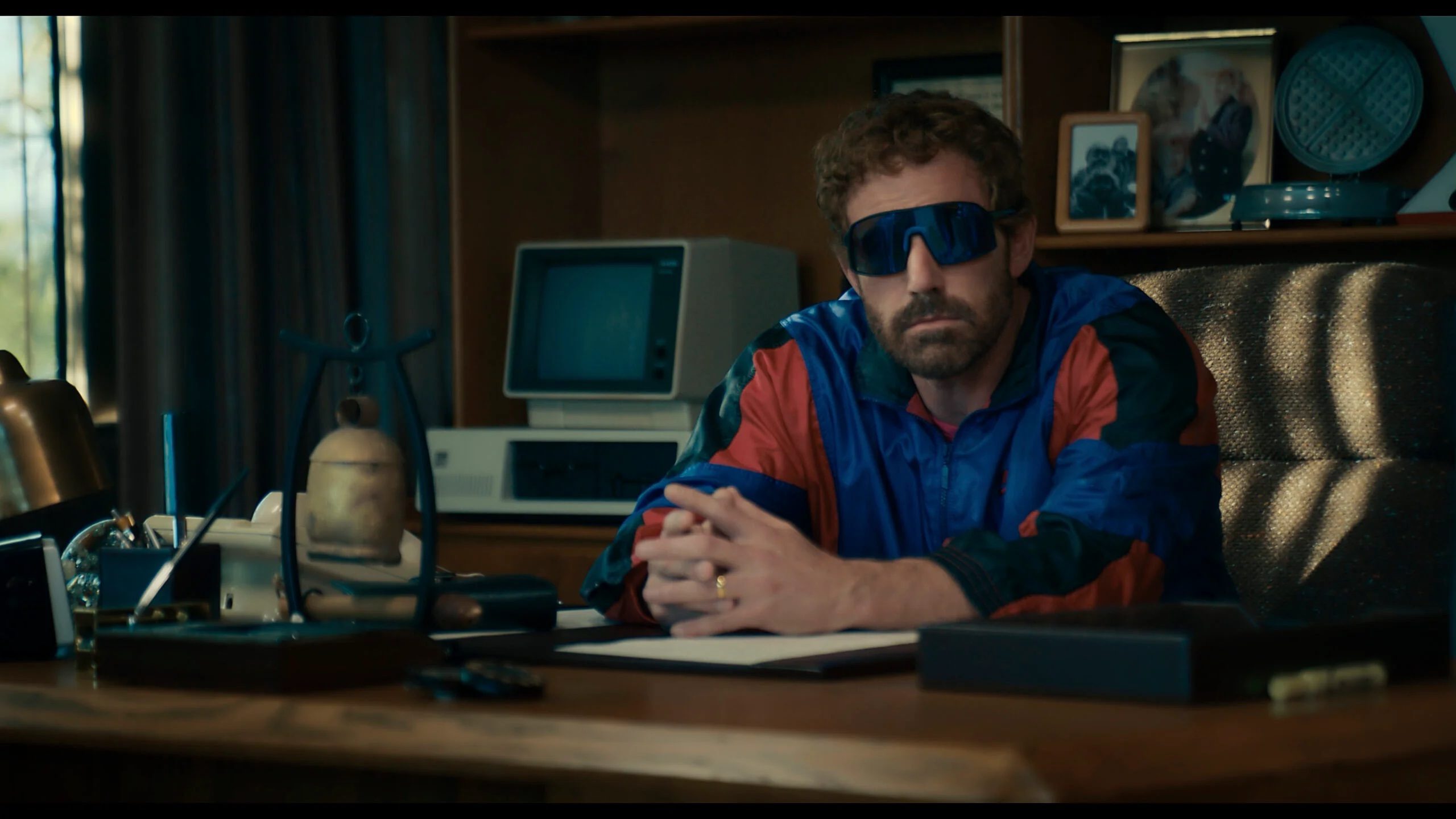

Score: 4 out of 5
Air is a swift 80s time capsule of a sports biopic with fewer sports and more shoes and marketing. It shows us what happens when underdog basketball players and sneaker producers join hands and make history. A history spelled out in the expected chyrons before the credits: that Air Jordans made $162 million in sales in the first year, account for $4 billion in annual sales for Nike today and make Michael Jordan himself over 200 million from the deal annually. It’s a wild story of high-stakes business logistics that manages to pull off an enjoyable time packed with outstanding performances (and a soundtrack of bangers that must have cost a fortune) despite being married to the genre’s formula we’ve seen a hundred times.
